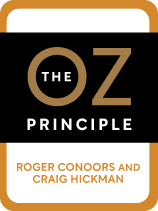

This article is an excerpt from the Shortform book guide to "The Oz Principle" by Roger Connors, Tom Smith, and Craig Hickman. Shortform has the world's best summaries and analyses of books you should be reading.
Like this article? Sign up for a free trial here .
Are you looking for The Oz Principle quotes? What are some of the most noteworthy passages worth revisiting?
In The Oz Principle, Craig Hickman, Roger Connors, and Tom Smith explain how to journey, like Dorothy from The Wizard of Oz, from a mindset of victimism to one of accountability. The Oz Principle is: To reach your goals, take initiative and assume accountability for your circumstances and your future.
Below is a selection of The Oz Principle quotes with explanations.
The Oz Principle: Quotes by Hickman, Connors, and Smith
In their book The Oz Principle, Craig Hickman, Roger Connors, and Tom Smith lay out four steps to accountability that will move you to success both in your personal life and in your organization. The authors explain how to journey, like Dorothy from The Wizard of Oz, from a mindset of victimism to one of accountability.
The following The Oz Principle quotes highlight some of the key ideas.
“Accountability: “A personal choice to rise above one’s circumstances and demonstrate the ownership necessary for achieving desired results—to See It, Own It, Solve It, and Do It.”
The idea of accountability is at the heart of The Oz Principle philosophy. Accountability means understanding that you control your own fate. To hold yourself accountable, you have to become comfortable examining the part you play (through action or inaction) in getting into or remaining in negative situations.
“When bad things unexpectedly happen, as they always do, or when serious errors in judgment occur, as they do more often than most of us wish to admit, accountable companies and their executives take action to control the damage and set a new course for achieving results.”
Taking action, is about staying committed and following through—not just when it comes to solving one problem, but when it comes to making accountability part of your day-to-day life. The authors caution that people sometimes master the first three steps toward accountability—facing problems, acknowledging their responsibility, and figuring out solutions—then fail to implement these solutions. However, a lack of follow-through on one issue can create a domino effect:
- The problem you’re neglecting to solve could be feeding into other, related issues, and you might not catch those related issues until you’ve addressed the initial problem.
- You’ll miss the chance to implement better strategies and processes, which leaves you less prepared to deal with future problems.
- Getting a team excited about potential solutions and guiding them into a mindset of accountability and ownership, only for all that talk to go nowhere, is disappointing. It’s like a broken promise. You might find it hard to inspire that enthusiasm again. (Shortform note: Conversely, following through in the workplace has multiple benefits: employee engagement increases, you create a culture of honoring commitments as employees emulate your behavior, the performance management process becomes more meaningful as employees understand they must follow through.)
“Left uncorrected in an organization, victim attitudes can erode productivity, competitiveness, morale, and trust to the point that correction becomes so difficult and expensive that the organization can never fully heal itself.”
The victim mentality is the collection of beliefs, attitudes, and thinking patterns that emphasize your powerlessness in the face of circumstances and other people’s actions. The authors distinguish between two types of victim behavior: passivity and selfishness.
Passivity
This category includes:
- Ignoring or denying problems
- Acknowledging a problem but waiting for it to go away on its own, or for an obvious solution to appear
- Using confusion as an excuse to not solve a problem
- Refusing to respond to a problem unless it’s on someone’s direct orders
We see these behaviors everywhere—in individuals, within companies, and even on a larger, national scale. Consider the issue of climate change: Many people ignore it, deny its existence, pretend it doesn’t and won’t affect them, or claim it will fix itself over time. But none of those approaches will resolve the problem.
Selfishness
The second category of victim behavior includes:
- Shifting responsibility or blame onto other people
- Preparing excuses in advance in case something goes wrong
- Creating a narrative that justifies your actions and absolves you of any wrongdoing
- Choosing not to get involved in order to avoid risk
By blaming others rather than considering how your actions (or inaction) played a part in the failure, you’re unlikely to learn, and you set yourself up to miss future problems as well. People who avoid accountability end up feeling powerless and losing motivation, which makes it even harder to move from failure to success.

———End of Preview———
Like what you just read? Read the rest of the world's best book summary and analysis of Roger Connors, Tom Smith, and Craig Hickman's "The Oz Principle" at Shortform .
Here's what you'll find in our full The Oz Principle summary :
- Why you have more power to create change than you may realize
- How to stop thinking like a victim
- The four steps to mastering accountability






